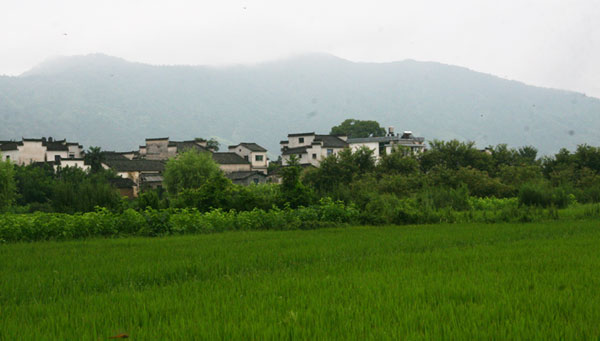 |
|
The beautiful ancient village of Nanping in southwestern Yixian county, Anhui Province, has been a popular filming location for many Chinese movies and television. [Photo: CRIENGLISH.com]
|
We followed a narrow cobblestone path winding through expansive green fields on both sides as we entered Nanping village in southwestern Yixian county in Anhui Province. This is the filming location of two of the most internationally acclaimed Chinese movies - the Oscar-nominated "Ju Dou" by renowned director Zhang Yimou in 1990 and the Oscar-winning film "Crouching Tiger and Hidden Dragon" by Ang Lee in 2000.
Since then, tourists have flocked to this century old village, which they know only from the silver screen, to explore it with great interest and curiosity.
The vintage trees that perch on the grasslands at the entrance to the village appeared even greener and fresher after a rainfall. We unconsciously slowed our pace and became absorbed in the village's ambience.
We glimpsed residents washing things by a nearby stream, working in distant fields or chatting in narrow lanes as we passed through. The village contains 300 well-preserved ancient buildings with grey tiles and white walls, dating back to the Ming and Qing dynasties.
But our immediate sense of comfort gradually turned into unease as we walked along a mazelike network of 72 intertwining lanes and realized we could easily get lost. The lanes make for a grand view for visitors to the village, in addition to the ancestral halls, what Nanping is best known for. The buildings are a unique feature of ancient China's feudal society where the clan system dominated.
In those old days, there were about 1,000 inhabitants in 300 households, most of which belonged to the Ye clan. Smaller portions of the population belonged to the Cheng and Li clans.
The patriarchal system played a vital role in maintaining social order in feudal China, solidifying the masses and stabilizing clan development. A clan's ancestral hall such as Xuzhi Hall or Kuiguang Hall was the spiritual home of its members.
Xuzhi Hall, or Ye's Ancestral Hall, was the setting for the film "Ju Dou". Props from the film set still decorate the hall, including an overhead sign at the building's entrance which was altered to read "Yang's Dye-house."
We pushed open the door, and a magnificent sight came into view - a colorful meter-long cloth hung in the patio in the traditional three-hall-and-two-courtyard style house that conjured up images of the classic tragedy. The building constituted a sharp contrast with the grey tones of other structures. It seemed as if it was the personification of the contrast in the emotions of the characters in "Ju Dou".